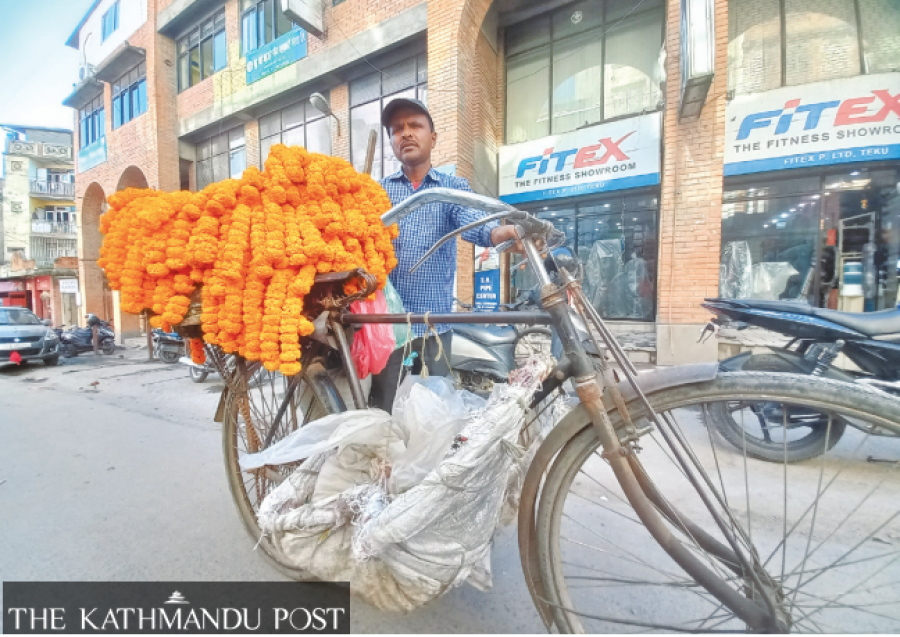Valley
Flower vendors turn roaming salespersons as Kathmandu bans sidewalk shops
Footpaths that would be full of flower sellers during Tihar are almost empty. It’s a different picture in Lalitpur.
Anup Ojha
Until last year Gaurishankar Mishra and his wife Radhika, retail vegetable sellers at Kalimati, would be quite excited around this time of the year. For a good reason. They could earn a little extra by selling marigolds on the railing adjoining the footpath. They could not do so this year, after the Kathmandu Metropolitan City banned footpath vendors.
The City had started cracking down on footpath vendors from the first week of July. Mishra had an alternative plan all along. He has taken out his old bicycle, and has been roaming Kathmandu's alleys selling flowers since Sunday, marking the Kag Tihar, the first day of Tihar on which the Hindus worship the crow.
Flowers like marigold are in high demand in Kathmandu during the festival. Mishra has stocked up flowers in his room which he delivers around the city on his bicycle.
“Until last year, our children were selling flowers during Tihar. Now they are in the room,” said Gaurisankar, 37, whom the Post met as he was pushing his loaded bicycle in Teku.
“The City officials have been rather harsh on working folks like us,” said Mishra, who lives in a rented room in Teku, paying Rs8,000 a month.
He said he has stored fresh flowers worth Rs10,000 at his residence after buying them from the Kalimati vegetable market. He sells a garland for Rs60.
Sunita Thapa, 43, who would also make good money selling flowers on the street has taken a different approach after the city banned footpath business. Thapa goes around Kalimati carrying garlands all over her body.
“When the City officials come around, they chase me away,” said Thapa, who hails from Dhading and lives in a rented room in Bafal with her husband—a plumber—and three children.
“I am doing this so that I can earn some extra money to celebrate the festival amid rocketing prices,” said Thapa.
Experts say street vending needs regulation, not ad hoc crackdown.
Footpaths at Ratnapark, Kalimati, Koteshwar, Kalanki, Tukucha Khasibazar, among other places in the Capital, that used to be full of flower sellers are now almost empty. There are only a few sellers around, dodging municipal police.
“Until last Tihar, people from Gundu and other surrounding areas of Bhaktapur would come to sell flowers from a week before Tihar,” said Sonam Tsering Sherpa, a restaurant owner at Bhrikutimandap, near Tukucha. The place is empty this time.
“Many people would come here to sell basketfuls of flowers they grew, at rates much cheaper than the market prices. The strict municipal rules might have deterred them this time,” said Sherpa, who has been running the restaurant for the past five years.
The Floriculture Association Nepal has been concerned by the City’s action against flower vendors.

“Street sales would account for a half of the total flower business in Kathmandu,” said Min Bahadur Tamang, president of the association. “I don’t think the KMC made a wise decision.”
According to the association, Kathmandu Valley has a demand for 2.5 million garlands during Tihar.
“An estimated 1.2 million garlands would be sold on the streets. This might have caused some inconvenience but the City should have allowed the vendors at least during the Tihar,” said Tamang.
Local sellers from places like Ichangu Narayan, Godavari and Tathali in Kathmandu Valley come to the city with flowers during the second biggest festival of Nepalis. Traders from some 30 nearby districts also come for the same purpose.
“This will surely hamper the local economy,” Tamang said.
The association believes sales proceeds of marigolds, globe amaranths and chrysanthemums will hit Rs130.5 million this Tihar. Last year's sales were worth Rs110.92 million.
Nabin Manandhar, spokesperson for the City, said they have applied a stringent rule against footpath encroachers. “People are not allowed to sell flowers on the footpath,” he said. “They can only be sold in shops.”
Asked if the rule would deprive many low-income people of income during Tihar, he said the law applies to everyone. “They should find an alternative place to sell flowers,” said Manandhar. However, the City has not provided them any such alternate space.
On Sunday, the KMC tore down floral decorations at four shops in New Road, claiming that they had inconvenienced pedestrians.
“If business operators encroach upon footpaths in the name of beautification, we won’t allow them,” Manandhar said.
Lalitpur Metropolitan City, however, is softer on street vendors. Starting Sunday, the City has allowed vendors to sell goods on footpaths.
“During festivals like Dashain and Tihar, we permit street business because there will be fewer vehicles on the road,” said Lalitpur Mayor Chiri Babu Maharjan.
“In the festive season, we should be mindful of not taking away the earnings of low- income people.”




 9.83°C Kathmandu
9.83°C Kathmandu.jpg)














